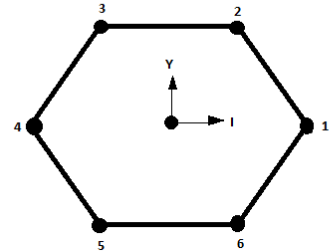Question
Question: Six objects are placed at the vertices of a regular hexagon. The geometric center of the hexagon is ...
Six objects are placed at the vertices of a regular hexagon. The geometric center of the hexagon is at the origin with objects 1 and 4 on the x-axis (see figure). The mass of the kthobject is mk=kiM∣cosθk∣where i is an integer, M is a constant with dimension of mass, and θk is the angular position of the kth vertex measured from the positive x-axis in the counterclockwise sense. If the net gravitational force on a body at the centroid vanishes, the value of i is?

(A)0
(B)1
(C)2
(D)3
Solution
Here, net gravitational force is zero then the forces from the opposite side of the object cancel out.
According to the question we have ,
net gravitational force is equal to zero.
mass of kthobject is mk=kiM∣cosθk∣
Complete step by step answer:
When the net gravitational force is zero then the diagonal opposite vertices of the hexagon should be equal to each other. So, depending upon this theory we will have 3 conditions.
m1=m4,m2=m5,m3=m6
We can take any one condition to get the value of I.
Let us take m1=m4
kiM∣cosθk∣k=1=kiM∣cosθk∣k=4
The value of θ1=0 and value of θ2=180
By substituting we have,
⇒1i∣cosθ1∣=4i∣cosθ4∣.
⇒1icos0∘=4icos180∘
Here, cos0∘=cos180∘=1
So we can write it as, we get,
⇒1i=4i
Here 1i=1we get,
⇒1=4i
We get,
⇒i=0
Hence the correct option is (A).
Note: We can get the same value for i if we even consider another two conditions. We can do another method for the same question which gives the same value fori.
Net gravitational force is equal to zero.
All Diagonal opposite vertices should have equal mass.
2iMcos60∘=4iMcos(60∘+180∘)
So,I=0.
